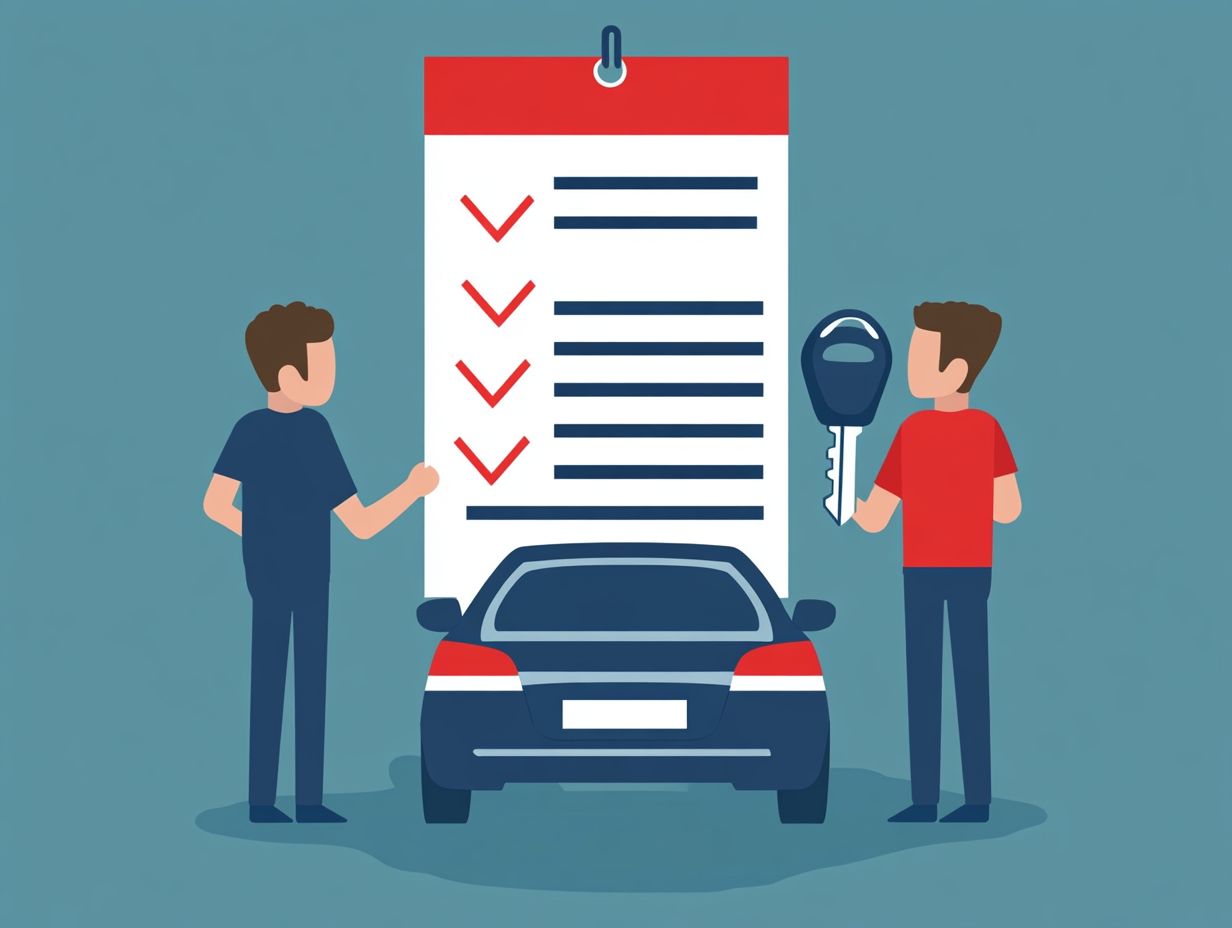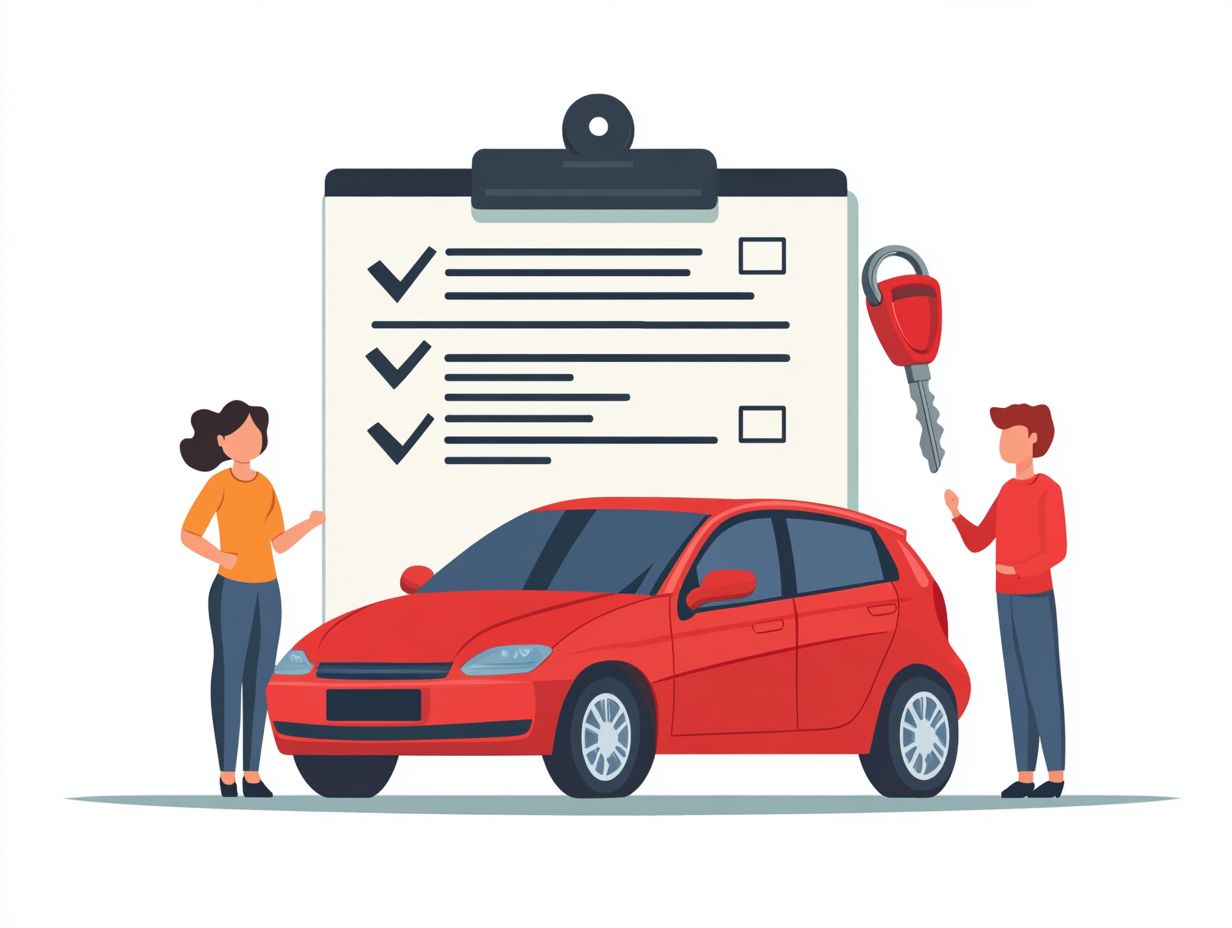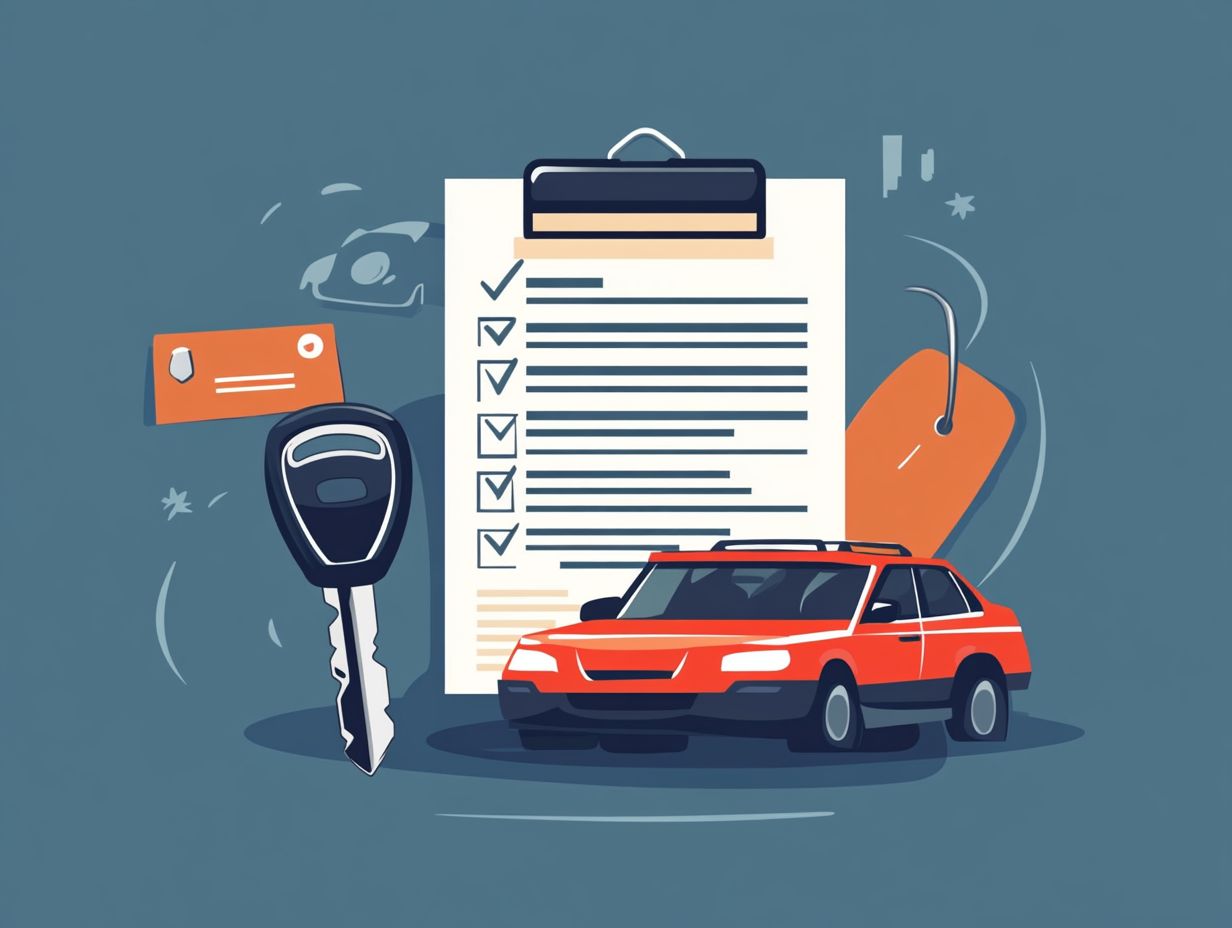Essential Checklist for New Car Buyers
Purchasing a new car can evoke a sense of excitement while also feeling a bit overwhelming. With countless options and factors to consider, having a checklist can make the process more enjoyable.
From setting your budget and identifying your needs to researching models and understanding the total costs involved, each step plays a vital role in guiding your decision. Get ready to discover essential tips that will lead you to the perfect car!
Continue reading to streamline your car-buying journey!
Contents
- Key Takeaways:
- 1. Determine Your Budget
- 2. Decide on Your Needs and Wants
- 3. Research Different Car Models
- 4. Consider the Cost of Ownership
- 5. Check for Safety Features
- 6. Test Drive the Car
- 7. Look for Warranty and Maintenance Plans
- 8. Consider Fuel Efficiency
- 9. Check for Available Financing Options
- 10. Negotiate the Price
- 11. Consider Insurance Costs
- 12. Get a Vehicle History Report
- 13. Review the Contract Thoroughly
- 14. Take Your Time to Make a Decision
- 15. Plan for Future Maintenance and Repairs
- Frequently Asked Questions
- What is an essential checklist for new car buyers?
- Why is having a checklist important for new car buyers?
- What are some items that should be included in an essential checklist for new car buyers?
- How can a checklist help in the car buying process?
- Is it necessary to have a checklist if I already know the car I want to buy?
- Can I customize my own essential checklist for new car buyers?
Key Takeaways:

- Set a realistic budget to avoid overspending and consider all associated costs.
- Create a list of must-haves and preferences to find a car that meets your needs.
- Research different car models to compare features, pricing, and ratings.
- Include ownership costs like insurance, maintenance, and fuel in your decision.
- Prioritize safety features and test drive the car to ensure it meets your standards.
- Look for warranty and maintenance plans to protect your investment.
- Consider fuel efficiency to save money in the long run.
- Explore financing options and negotiate the price to get the best deal.
- Factor in insurance costs to accurately budget for your new car.
- Get a vehicle history report to ensure the car’s condition.
- Thoroughly review the contract before signing to understand terms.
- Take your time to make an informed decision without feeling rushed.
- Plan for future maintenance and repairs to avoid unexpected expenses.
1. Determine Your Budget
Determining your budget is a crucial first step in the car purchasing process. It sets the stage for how much you can comfortably spend on your new vehicle.
Consider essential factors such as vehicle financing, your credit score, and monthly car payments. Understanding your total budget is vital it includes not just the down payment but also ongoing monthly payments that will shape your finances.
To ensure a smooth buying experience, use an auto loan calculator. This tool helps you see how different down payment amounts and interest rates affect your monthly obligations.
Websites like Bankrate and NerdWallet are invaluable for researching pricing and financing options. Compare offers and secure the best deals available in the market. By leveraging these resources, you can confidently navigate the choices and find a financing plan that aligns with your financial situation.
2. Decide on Your Needs and Wants
Deciding on your vehicle needs and wants is crucial to ensure that the car you choose aligns with your lifestyle and essential features that enhance your ownership experience.
When making this significant purchase, distinguish between what you genuinely need and what you simply desire. For example, you might need a spacious SUV for your growing family or a compact car for city navigation. Meanwhile, wants like a flashy color or cutting-edge tech features can often take a back seat.
Essential features such as fuel efficiency can lead to long-term savings, while high safety ratings provide peace of mind on the road. By balancing these needs and wants, you can find a car that not only meets your daily demands but also brings you joy for years to come.
Start your journey to your dream car today don’t wait!
3. Research Different Car Models
Researching different car models is an essential step in your buying journey. It gives you the power to compare new options using a comprehensive checklist that includes pricing, safety ratings, and features from trusted sources like Edmunds and Kelley Blue Book.
By tapping into online resources, you can explore specific attributes of each model, such as fuel efficiency and reliability, while diving into user reviews that provide valuable real-world insights. This thorough investigative approach not only expands your understanding of the available choices but also reveals any discrepancies in market pricing and promotional offers.
Taking the time to analyze the information at your disposal makes it easier to make well-informed decisions. This ensures that the vehicle you choose not only meets your personal needs but also delivers exceptional value for your investment.
4. Consider the Cost of Ownership
Understanding the total cost of ownership is essential for you as a prospective buyer. It goes beyond just the purchase price; it also includes ongoing expenses like maintenance, insurance, and vehicle financing options.
These additional costs can profoundly affect your budget, especially since fuel consumption can vary widely depending on the model you choose and your driving habits. Regular maintenance for example, oil changes, tire rotations, and those surprise repairs adds another layer to your financial commitment.
Then there’s insurance, which can change based on the vehicle’s make, age, and your driving history. All these factors can fluctuate significantly depending on what type of vehicle you re considering, whether it s a compact car or a luxury SUV.
Therefore, establishing a realistic budget that considers these variables is crucial for long-term affordability, ensuring that your journey into car ownership remains a sustainable choice.
5. Check for Safety Features

Checking for safety features is an absolute must in your car buying journey, as it ensures that the vehicle you select aligns with modern safety standards. Additionally, knowing what to check before buying a used car can enhance your overall driving experience.
In today’s landscape, vehicles come packed with an impressive array of safety technologies designed to protect both you and your passengers.
When prioritizing safety, consider these key elements:
- Airbags, which provide essential cushioning during a collision.
- Anti-lock brakes, helping you maintain control when you need to stop suddenly.
Advanced Driver-Assistance Systems (ADAS) are becoming essential. Features like lane departure warnings, adaptive cruise control, and automatic emergency braking work in harmony to reduce the likelihood of accidents.
By incorporating these vital components into your car checklist, you not only secure your peace of mind but also demonstrate a steadfast commitment to safety on the roads.
6. Test Drive the Car
Taking a test drive is an essential step in your car-buying journey, allowing you to experience the vehicle’s features up close and determine if it aligns with your driving preferences and comfort.
As you explore different models, pay attention to how each car handles sharp turns and sudden stops; this can provide valuable insight into its overall driving dynamics. Comfort matters just as much, so take a moment to assess the seating support and space, especially if you plan on those longer drives.
Consider modern technology features like adaptive cruise control and user-friendly infotainment systems that can significantly elevate your driving experience. Be sure to engage with the dealership; ask about specific tech features or driving modes to fully grasp how each model can seamlessly integrate into your lifestyle.
7. Look for Warranty and Maintenance Plans
Exploring warranty and maintenance plans is essential when you re in the market for a car. These options can greatly influence your long-term expenses and provide peace of mind when it comes to vehicle repairs.
Understanding the various types of warranties available is crucial. They can take different forms, including manufacturer and longer warranties. Manufacturer warranties typically cover a specific period or mileage, addressing issues stemming from manufacturing defects.
In contrast, longer warranties offer additional coverage for repairs that may crop up once the factory warranty has expired. This gives you an extra layer of security.
By grasping what each plan includes, you can make informed decisions that not only protect your investment but also enhance your overall experience as a car owner.
8. Consider Fuel Efficiency
Fuel efficiency is a crucial factor for you as a car buyer. It directly impacts your overall cost of ownership and aligns with your unique vehicle needs and lifestyle choices.
When you evaluate fuel efficiency ratings, consider various factors, such as the type of fuel your potential vehicle uses whether it’s gasoline, diesel, or hybrid options. This can significantly affect both efficiency and long-term expenses.
For example, hybrid vehicles often offer remarkable mileage, making them particularly appealing if you drive frequently.
Thanks to advancements in technology, lighter materials and more aerodynamic designs have emerged, enhancing fuel economy even further.
By choosing a vehicle with superior mileage, you save money at the pump and play a part in reducing your carbon footprint. It s a savvy decision that benefits both your finances and the environment.
9. Check for Available Financing Options
Exploring your financing options is a crucial step in the buying process. It allows you to grasp how your credit score influences your auto loan eligibility and the overall cost of your car purchase.
By examining various avenues like bank loans, dealership financing, and leasing, you can make informed decisions tailored to your financial situation. Each option presents its own set of advantages and disadvantages.
These affect both your monthly payments and the total interest you will pay over time. When considering dealership financing, it’s essential to evaluate any promotional offers that could enhance the attractiveness of your purchase.
Negotiating terms is vital; being well-informed about market rates gives you the power to confidently discuss interest rates and loan durations.
Securing pre-approval, or getting approved for a loan before you shop for a car, can significantly streamline your buying experience. This clarifies your budget and bolsters your bargaining position with dealerships.
10. Negotiate the Price

Master the negotiation process to snag the best deal on your new car! This expertise allows you to leverage your research and knowledge to achieve favorable terms from the dealership.
Equipping yourself with comprehensive market insights and understanding average prices for similar models enables you to approach discussions with the seller confidently. Establish a clear budget beforehand; this serves as a powerful anchor during negotiations.
Displaying confidence can significantly influence how the dealership views your commitment. Be ready to walk away if the terms don t meet your criteria; this empowers you to negotiate better deals today!
11. Consider Insurance Costs
Insurance costs are a key part of buying a car. These expenses can vary greatly based on your vehicle type and driving history, affecting your overall budget.
Gather insurance quotes from multiple providers to compare rates that suit your needs. Factors like the make, model, safety features, and age of the vehicle play a big role in determining these rates.
Expect higher premiums if you’re considering a sports car or one known for theft. Your credit history and annual driving distance will also impact pricing.
Keep these costs in mind as you shop. Make sure your budget can cover these essential expenses by understanding what to expect when buying a new car before sealing the deal on your new ride!
12. Get a Vehicle History Report
Getting a vehicle history report is vital, especially for used cars. This report reveals the car’s past ownership and condition.
Use reputable services like Auto Loan Review for detailed reports that highlight accidents, title issues, and maintenance history. Knowing these details is crucial they affect resale value and could signal potential safety concerns.
Take time to review this information carefully. It’s not just about how the car looks; it’s about ensuring it has a clean and reliable history that meets your expectations.
13. Review the Contract Thoroughly
Carefully review the contract before you sign. This ensures you understand all the terms, fees, and conditions from the dealership.
Examine the loan details, as these affect the total cost over time. Don’t overlook warranty conditions, which can vary and affect future repair costs.
Watch out for extra fees like documentation or dealer preparation fees they can significantly change the final amount. Ask the salesperson any questions to clarify uncertainties; understanding every clause will enhance your buying experience!
14. Take Your Time to Make a Decision
Take your time when purchasing a car. This gives you the chance to ensure the vehicle aligns with your needs and long-term goals.
In a fast-paced world, it’s easy to feel pressured by eager salespeople. Remember, making the right choice requires careful thought.
Revisit your car checklist to reaffirm your choices and clear any doubts. This will boost your confidence and ensure that everything, from your budget to the car’s features, meets your expectations. For more insights, check out our guide on how to prepare for new car ownership!
15. Plan for Future Maintenance and Repairs

Planning for future maintenance and repairs is a vital aspect of responsible car ownership. It ensures that your vehicle remains in optimal condition and retains its value over time.
Establish a regular maintenance schedule. This helps prevent breakdowns and minimize costly repairs over time. Set aside money for unexpected repairs. This way, you’re ready instead of rushed when something goes wrong. It’s advisable to set aside a small percentage of your monthly budget specifically for automotive upkeep.
Find a trusted mechanic or service center. They know your vehicle and can give you personalized advice, better rates, and priority service during emergencies. Maintaining open communication about your vehicle’s needs ensures that repairs are handled efficiently and within your budget.
Frequently Asked Questions
What is an essential checklist for new car buyers?
An essential checklist for new car buyers is a list of important items and considerations that should be addressed before purchasing a new car. You can find the essential checklist for car financing, which helps buyers make informed decisions and ensures they get the best value for their money.
Why is having a checklist important for new car buyers?
A checklist is important for new car buyers because it helps them stay organized and focused on their needs and priorities. It also serves as a reminder of important factors to consider, such as the essential maintenance checklist for new cars, preventing them from overlooking critical details that could impact their purchase.
What are some items that should be included in an essential checklist for new car buyers?
Some items that should be included in an essential checklist for new car buyers are budget, needs and preferences, research on car models and brands, test drives, financing options, and negotiation strategies.
How can a checklist help in the car buying process?
A checklist can help in the car buying process by providing a step-by-step guide and ensuring that all necessary tasks and considerations are addressed. For those looking to streamline this process, knowing how to prepare for a new car purchase can also serve as a reference during the negotiation and decision-making process.
Is it necessary to have a checklist if I already know the car I want to buy?
Yes, it is still necessary to have a checklist even if you already know the car you want to buy. It can help you consider other important factors such as financing options, additional features, and potential maintenance costs that you may have overlooked. For a comprehensive overview, refer to the ultimate guide to buying a new car.
Can I customize my own essential checklist for new car buyers?
Yes, you can customize your own essential checklist for new car buyers according to your specific needs and preferences. For a comprehensive list, consider reviewing the essential documents needed for a new car purchase, or use online templates or checklists provided by car buying experts as a guide.






